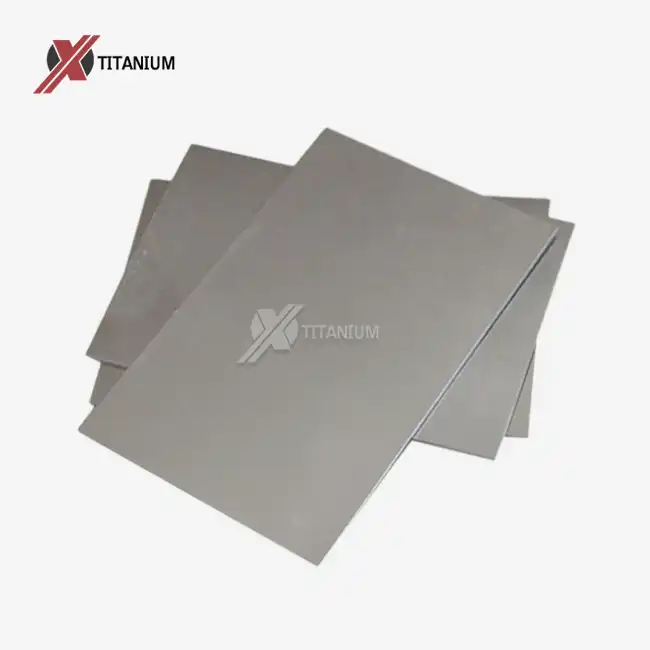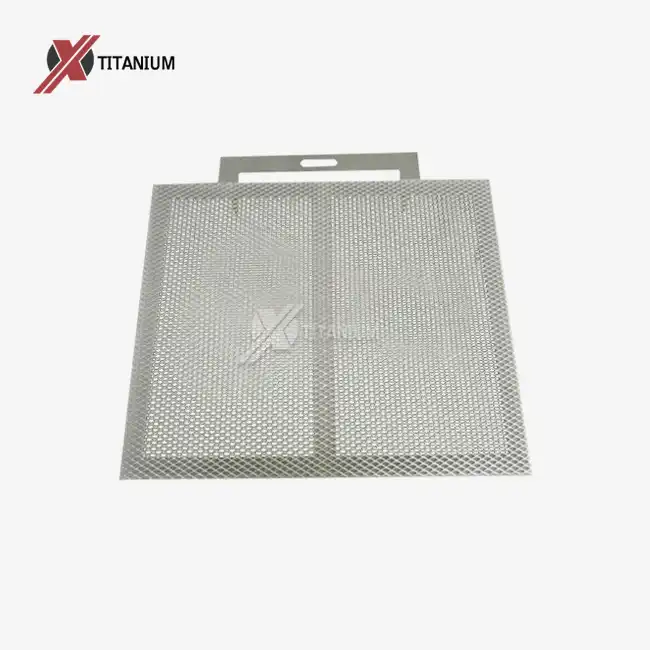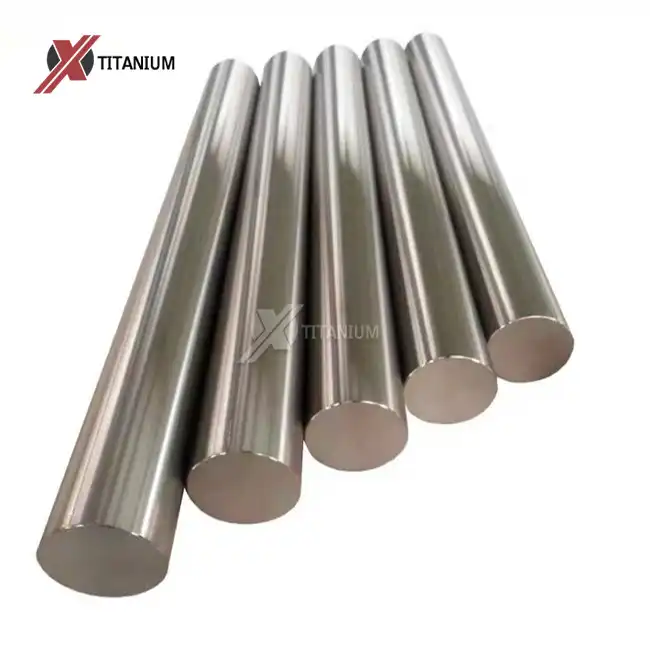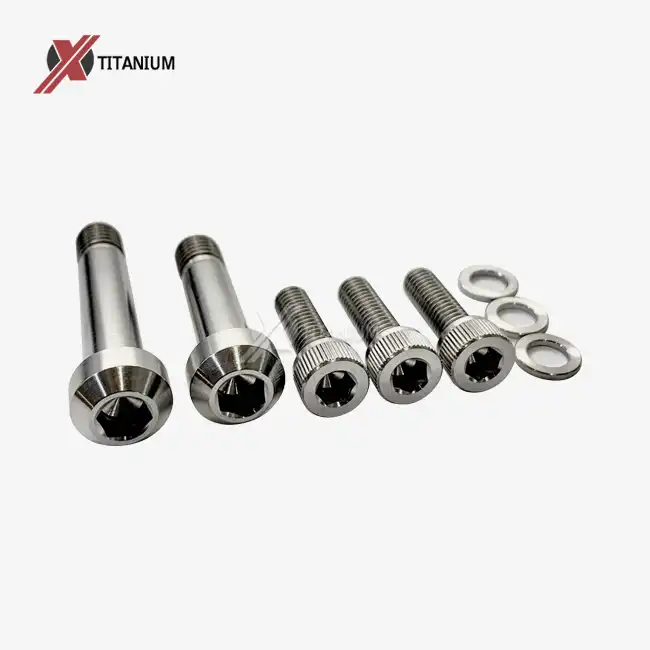When selecting the best titanium alloy screws for aircraft manufacturing, Ti-6Al-4V (Grade 5) fasteners consistently emerge as the industry standard. These aerospace fasteners deliver exceptional strength-to-weight ratios, superior corrosion resistance, and proven reliability in critical applications. The combination of lightweight components with high strength makes them indispensable for modern aircraft construction where every gram matters and structural integrity cannot be compromised.
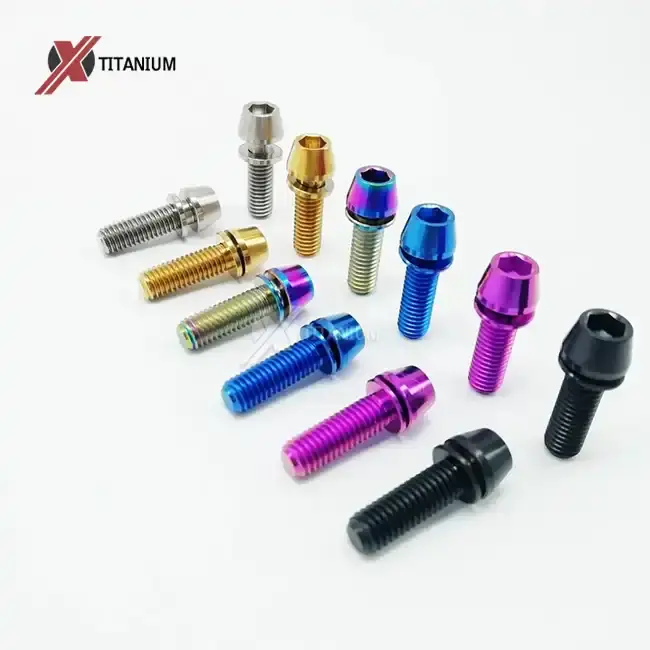
Introduction
The aerospace industry demands nothing short of perfection when it comes to fastening solutions, and titanium alloy screws have revolutionized aircraft manufacturing. As someone who has witnessed the evolution of aerospace materials over the past decade, I can confidently say that these precision engineering marvels represent the pinnacle of fastener technology. The aviation sector's relentless pursuit of weight reduction, combined with stringent safety requirements, has made titanium-based threaded fasteners essential components in modern aircraft design.
Aircraft manufacturers face unique challenges that standard steel fasteners simply cannot address. The extreme temperature variations experienced during flight, from ground-level heat to high-altitude cold, demand materials with exceptional thermal stability. Additionally, the corrosive environment created by moisture, salt air, and various chemicals requires fasteners with outstanding corrosion resistance. Titanium alloys meet these demands while providing the lightweight characteristics crucial for fuel efficiency and payload optimization.
Why Focus on Titanium Alloy Screws for Aviation Applications?
The aircraft manufacturing industry has embraced titanium fasteners for compelling reasons that extend far beyond their impressive specifications. These engineering materials offer a unique combination of properties that address multiple pain points simultaneously. Weight reduction remains paramount in aerospace design, where every pound saved translates to improved fuel efficiency and increased payload capacity. Titanium's density of approximately 4.5 g/cm³ makes it 40% lighter than steel while maintaining comparable strength characteristics.
Durability plays an equally critical role in aircraft applications. Commercial aircraft operate for decades, accumulating tens of thousands of flight hours under varying conditions. The fasteners holding these machines together must maintain their integrity throughout this extended service life. Titanium's exceptional fatigue resistance and stability under cyclic loading make it ideal for these demanding applications. The material's non-magnetic properties also prevent interference with sensitive avionics systems, a consideration often overlooked but critically important in modern aircraft design.
Selection Criteria for Premium Aerospace Fasteners
Choosing the optimal titanium alloy screws requires careful evaluation of multiple factors that impact both performance and long-term reliability. Material composition stands as the primary consideration, with Ti-6Al-4V emerging as the gold standard for aerospace applications. This alloy combines 6% aluminum and 4% vanadium with pure titanium, creating a material with tensile strength up to 900 MPa while maintaining excellent ductility and corrosion resistance.
Manufacturing processes significantly influence fastener quality and performance characteristics. CNC machining ensures precise dimensional tolerances essential for aerospace applications, while proper heat treatment optimizes mechanical properties. Surface treatments such as anodizing or nitriding enhance corrosion resistance and can provide visual identification through various color options including natural titanium, gold, blue, green, purple, black, and rainbow finishes.
Certification and traceability represent non-negotiable requirements in aircraft manufacturing. Fasteners must comply with AS9100 standards and maintain complete documentation from raw material sourcing through final inspection. Temperature resistance capabilities, typically ranging up to 500°C depending on the specific alloy, ensure reliable performance across the operational envelope of modern aircraft.
Top 6 Titanium Alloy Screws for Aircraft Manufacturing
Ti-6Al-4V Socket Head Cap Screws
These precision-engineered fasteners represent the workhorse of aerospace applications, combining exceptional strength with versatile installation characteristics. The socket head design provides excellent torque transmission while maintaining a low-profile installation suitable for space-constrained applications. Manufactured from Grade 5 titanium alloy, these titanium alloy screws deliver tensile strength up to 900 MPa with outstanding fatigue resistance crucial for cyclic loading conditions common in aircraft structures.
The manufacturing process involves precision CNC machining from certified titanium bar stock, ensuring consistent mechanical properties and dimensional accuracy. Heat treatment optimizes the microstructure for maximum strength and ductility, while careful surface preparation eliminates stress concentrations that could lead to premature failure. Available in standard metric sizes from M2 to M36, these fasteners accommodate a wide range of aircraft applications from avionics mounting to primary structural connections.
Corrosion resistance stands out as a key advantage, with these fasteners demonstrating excellent performance in saltwater environments and exposure to various aircraft fluids. The passive oxide layer that naturally forms on titanium surfaces provides long-term protection without requiring additional coatings. Temperature stability ensures reliable performance from ground operations in desert environments to cruise altitudes where temperatures can drop below -50°C.
Quality control measures include 100% dimensional inspection, mechanical property verification, and chemical composition analysis. Each batch undergoes rigorous testing to verify compliance with aerospace specifications, ensuring consistent performance across production runs. The lightweight nature of these fasteners contributes significantly to overall aircraft weight reduction goals while maintaining the structural integrity required for safety-critical applications.
Ti-6Al-4V Button Head Socket Screws
Button head socket screws excel in applications requiring flush or near-flush installation with enhanced aesthetic appeal and aerodynamic considerations. The rounded head profile reduces stress concentrations while providing sufficient bearing area for reliable load transfer. These aerospace fasteners find extensive use in exterior panels, fairings, and other applications where smooth surface profiles impact airflow characteristics.
Material properties mirror those of standard Ti-6Al-4V alloys, with careful attention to head geometry optimization for aerospace applications. The socket design accommodates standard hex keys while providing sufficient engagement depth for reliable torque application. Surface finishing options include various anodizing treatments that not only enhance corrosion resistance but also provide color coding for different applications or torque specifications.
Manufacturing precision ensures consistent head height and socket depth across production runs, critical factors for automated assembly processes common in modern aircraft manufacturing. The button head configuration distributes clamping loads effectively while minimizing the risk of damage to composite materials increasingly used in aircraft construction. Biocompatibility characteristics, while primarily important for medical applications, also benefit aircraft applications by ensuring compatibility with various sealants and adhesives.
Installation advantages include reduced tool access requirements compared to traditional hex head fasteners, particularly valuable in confined spaces within aircraft assemblies. The smooth head profile minimizes opportunities for foreign object damage (FOD) while simplifying cleaning and inspection procedures. Long-term reliability testing demonstrates excellent performance under the thermal cycling and vibration conditions typical of aircraft operations.
Ti-5Al-2.5Sn Aerospace Grade Phillips Head Screws
This specialized titanium alloy offers enhanced high-temperature performance characteristics particularly valuable in engine compartment and high-heat applications. The Ti-5Al-2.5Sn composition provides superior creep resistance at elevated temperatures while maintaining excellent corrosion resistance and lightweight properties. Phillips head configuration enables rapid installation using standard tooling familiar to assembly technicians.
The alloy's unique properties include enhanced stability at temperatures up to 500°C, making these fasteners ideal for applications near engine components or in areas subject to heat soaking. Manufacturing processes include specialized heat treatments that optimize the microstructure for high-temperature service while maintaining room-temperature mechanical properties suitable for assembly operations.
Precision manufacturing ensures consistent Phillips socket geometry that provides reliable tool engagement without the risk of cam-out under proper torque application. Surface treatments can include specialized high-temperature coatings that further enhance performance in extreme environments. The lightweight nature of this alloy contributes to overall aircraft weight savings while providing the reliability required for critical applications.
Quality assurance includes elevated temperature testing to verify creep resistance and dimensional stability under thermal cycling conditions. Each production lot undergoes comprehensive mechanical testing at both room temperature and elevated temperatures to ensure consistent performance. Traceability documentation includes complete chemical analysis and mechanical property verification, essential for aerospace applications requiring full material pedigree.
Titanium Alloy Countersunk Head Screws
Countersunk head screws provide the ultimate solution for applications requiring completely flush installation without compromising structural integrity. The conical head design transfers loads efficiently while creating smooth exterior surfaces essential for aerodynamic performance. These fasteners excel in wing skins, control surfaces, and other applications where surface discontinuities impact airflow characteristics.
Manufacturing precision focuses on achieving consistent head angles and dimensions critical for proper seating in countersunk holes. The 100-degree included angle has become standard for aerospace applications, providing optimal load distribution while maintaining adequate material thickness in the fastened components. CNC machining ensures precise geometric tolerances that enable automated installation processes.
Material selection typically involves Ti-6Al-4V for its proven performance characteristics and extensive qualification history in aerospace applications. The countersunk head geometry requires careful attention to stress concentration factors, addressed through precise manufacturing and surface finishing techniques. Heat treatment optimizes mechanical properties while maintaining the dimensional stability required for precise head seating.
Installation considerations include proper hole preparation and countersinking techniques that ensure full head contact and optimal load transfer. The flush installation eliminates opportunities for foreign object accumulation while providing smooth surfaces for inspection and maintenance activities. Long-term durability testing confirms excellent performance under the fatigue loading conditions common in aircraft structures.
Ti-6Al-4V Self-Tapping Aerospace Screws
Self-tapping screws revolutionize aircraft assembly by eliminating the need for pre-tapped holes while maintaining the superior properties of titanium alloys. These innovative fasteners incorporate specialized thread geometries that cut or form mating threads during installation, reducing assembly time and simplifying manufacturing processes. The self-tapping feature proves particularly valuable in thin-wall applications and composite materials.
Thread design optimization ensures reliable thread formation without excessive installation torque that could damage surrounding materials. The cutting edges undergo precise manufacturing to maintain sharpness throughout the thread-forming process while avoiding work hardening that could compromise subsequent performance. Material properties include enhanced hardness in the threaded portion while maintaining ductility in the head region.
Manufacturing processes involve specialized machining techniques that create the complex thread geometries required for reliable self-tapping performance. Quality control includes thread-forming torque testing and pullout strength verification to ensure consistent performance across production runs. Surface treatments can enhance the thread-forming characteristics while providing corrosion protection and visual identification.
Application advantages include reduced assembly complexity and improved consistency compared to traditional tapped holes. The self-tapping action creates intimate thread contact that can enhance vibration resistance compared to conventional threaded connections. Installation flexibility allows for field repairs and modifications without requiring specialized tapping equipment, valuable for maintenance operations.
Titanium Alloy Hex Head Cap Screws with Anti-Seize Coating
Hex head cap screws with specialized anti-seize coatings address the challenge of galvanic corrosion and galling that can occur when titanium fasteners contact dissimilar metals. The coating systems prevent metal-to-metal contact while maintaining the electrical and thermal properties required for aircraft applications. These fasteners excel in mixed-material assemblies and high-torque applications.
Coating selection involves careful consideration of operating environment, temperature range, and compatibility with adjacent materials. Silver-based coatings provide excellent lubricity and conductivity, while ceramic-based systems offer superior temperature resistance and chemical inertness. Application methods ensure uniform coverage and proper adhesion to the titanium substrate.
The hex head configuration provides maximum torque transmission capability while accommodating standard tooling used throughout the aerospace industry. Precision manufacturing ensures consistent head dimensions and socket tolerances that enable reliable tool engagement. The combination of titanium's inherent properties with specialized coating systems creates fasteners suitable for the most demanding applications.
Performance testing includes galvanic compatibility studies, thermal cycling, and long-term exposure to aircraft fluids and environmental conditions. The anti-seize characteristics remain effective throughout extended service intervals, reducing maintenance requirements and improving overall system reliability. Installation torque specifications account for the coating properties while ensuring adequate clamping force for structural integrity.
Global Market Analysis and Regulatory Landscape
The worldwide aerospace fastener market reflects the industry's commitment to safety, performance, and innovation. Regulatory frameworks vary across regions but share common emphasis on material traceability, manufacturing quality, and performance verification. European EASA regulations parallel FAA requirements in demanding comprehensive documentation and testing for all aerospace materials, including titanium fasteners.
Cultural preferences in different markets influence fastener selection and application methods. Asian markets often prioritize cost-effectiveness while maintaining quality standards, leading to increased adoption of standardized fastener designs that reduce inventory complexity. European manufacturers typically emphasize environmental considerations, driving demand for recyclable materials and sustainable manufacturing processes. North American markets focus heavily on performance optimization and technological advancement.
Supply chain considerations have become increasingly important following recent global disruptions. Aerospace manufacturers now prioritize supplier diversification and regional sourcing capabilities to ensure continuity of critical components like titanium fasteners. This trend has created opportunities for qualified manufacturers worldwide while emphasizing the importance of maintaining international quality standards and certifications.
Purchasing Recommendations and Key Considerations
Successful procurement of titanium fasteners requires careful evaluation of supplier capabilities beyond simple price comparison. Manufacturing expertise, quality systems, and technical support capabilities often prove more valuable than marginal cost savings. Suppliers should demonstrate comprehensive testing capabilities, including mechanical property verification, chemical analysis, and environmental testing relevant to aerospace applications.
Certification requirements demand particular attention, with AS9100 qualification representing the minimum standard for aerospace suppliers. Additional certifications such as NADCAP for special processes and ISO 9001 for quality management provide additional assurance of supplier capability. Documentation requirements include complete material traceability from raw material sourcing through final inspection and testing.
Lead time considerations reflect the specialized nature of titanium fastener manufacturing and the complexity of aerospace quality requirements. Custom specifications, special coatings, or non-standard sizes typically require extended manufacturing periods. Establishing relationships with qualified suppliers early in the design process enables better planning and reduces the risk of schedule delays.
Industry Trends and Future Outlook
The titanium fastener industry continues evolving to meet increasingly demanding aerospace requirements. Additive manufacturing technologies show promise for complex geometries and rapid prototyping, though traditional machining remains dominant for production volumes. Advanced surface treatments and coating systems expand application possibilities while addressing specific performance challenges. The growing emphasis on sustainability drives development of recycling processes and environmentally friendly manufacturing methods, positioning titanium alloys favorably due to their inherent recyclability and long service life.
Conclusion
Selecting the best titanium alloy screws for aircraft manufacturing requires careful consideration of material properties, manufacturing quality, and supplier capabilities. The fasteners discussed in this analysis represent proven solutions that address the unique challenges of aerospace applications while delivering the performance and reliability that aircraft manufacturers demand. Ti-6Al-4V remains the industry standard, offering exceptional strength-to-weight ratios and corrosion resistance, while specialized alloys like Ti-5Al-2.5Sn provide enhanced high-temperature capabilities for demanding applications. Success in aerospace fastener procurement depends on partnering with qualified suppliers who understand the critical nature of these components and maintain the quality systems necessary to support aircraft manufacturing requirements.
Frequently Asked Questions
Q1: What makes Ti-6Al-4V the preferred alloy for aircraft manufacturing applications?
A: Ti-6Al-4V offers the optimal balance of strength, weight, and corrosion resistance for aerospace applications. Its tensile strength up to 900 MPa combined with 40% weight reduction compared to steel makes it ideal for aircraft where every gram matters. The alloy's proven track record and extensive qualification database in aerospace applications also provide confidence for engineers and certification authorities.
Q2: How do titanium fasteners perform in extreme temperature conditions encountered in aviation?
A: Titanium alloy screws maintain excellent performance across the temperature range encountered in aircraft operations, typically from -50°C at cruise altitude to over 200°C in engine compartments. Ti-6Al-4V retains its mechanical properties throughout this range, while specialized alloys like Ti-5Al-2.5Sn provide enhanced performance up to 500°C for high-temperature applications.
Q3: What quality certifications should I look for when selecting a titanium fastener supplier for aerospace applications?
A: Essential certifications include AS9100 for aerospace quality management systems, along with material certifications for the specific titanium alloys used. Look for suppliers with NADCAP approval for special processes, comprehensive testing capabilities, and complete traceability documentation. The supplier should also demonstrate experience with aerospace applications and understanding of industry-specific requirements.
Partner with Chuanglian for Superior Titanium Alloy Screws Manufacturing Excellence
Chuanglian stands ready to meet your aerospace fastener requirements with over ten years of specialized experience in titanium processing and machining. Our comprehensive capabilities encompass the complete range of titanium alloy screws discussed in this analysis, from standard Ti-6Al-4V socket head caps to specialized high-temperature fasteners with custom surface treatments. Located in Baoji City, known as the "City of Titanium," we combine proximity to premium raw materials with advanced CNC machining capabilities and rigorous quality control systems.
Our manufacturing facility houses more than a dozen CNC machine tools specifically configured for precision titanium machining, enabling us to maintain the tight tolerances essential for aerospace applications. Every fastener undergoes comprehensive testing and inspection protocols that exceed industry standards, ensuring the consistency and reliability your projects demand. From prototype development through full production runs, our technical team provides the expertise and support that aerospace manufacturers require for successful project completion.
When you need a trusted titanium alloy screws supplier who understands the critical nature of aerospace applications, contact us at info@cltifastener.com or djy6580@aliyun.com. Our commitment to quality, reliability, and customer success has established long-term partnerships with aerospace manufacturers worldwide, and we're ready to contribute to your next project's success.
